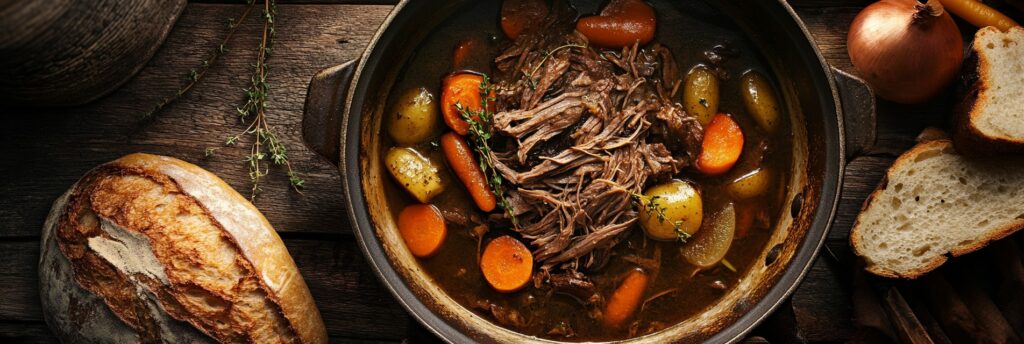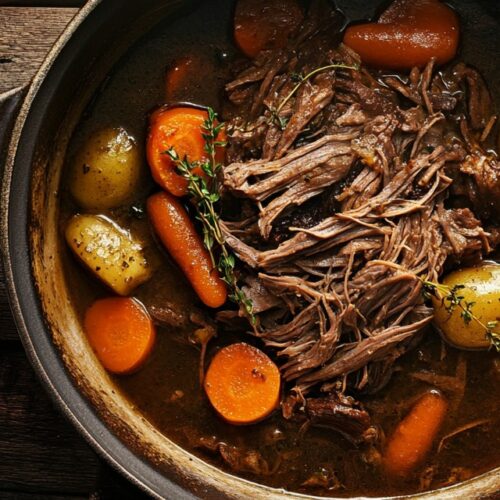Asmund’s decision to remodel The Burly Earl was ambitious, and the work was as relentless as any battle. He’d brought in a team of stonemasons, carpenters, and laborers—hardy folk accustomed to long days. To keep their spirits high and bellies full, Asmund chose a dish that had sustained him on the road countless times: the newly christened “Lord’s Hearth Roast.” A meal perfect for feeding a hungry crew with minimal fuss, it was hearty, delicious, and easy to prepare.
Each morning before the crew arrived, Asmund would set to work in the remodeled kitchen. He took a large, heavy pot and placed it on a low fire, adding a generous slab of beef. “A roast fit for a lord, made with the ease of a campfire stew,” he’d say, laughing as he layered in vegetables and poured in a rich broth. Into the pot went root vegetables, sprigs of thyme, and several cloves of garlic—ingredients simple enough to source and forgiving to cook. This was food that could wait patiently, simmering on the fire without demanding attention, freeing Asmund to oversee the renovation.

The dish was remarkably simple: he’d rub the beef with a coarse salt blend and place it in the pot with chopped potatoes, carrots, and onions. A dash of the famed Neverwinter stout he kept behind the bar was his secret touch, adding a depth of flavor to the broth. Asmund tossed in pickled caps for a bit of tang, a clever addition that would elevate the dish without overwhelming it. As a finishing touch, he arranged rounds of freshly baked, crusty bread alongside each plate—perfect for soaking up the savory juices left behind.
A Perfect Fit for a Busy Day
As the work progressed, the aroma of the roast filled the tavern, drifting out through the open windows and drawing the hungry crew. The beauty of Lord’s Hearth Roast was in its simplicity—no complicated ingredients, no need for constant tending. Asmund knew that he could trust the fire to do the work, breaking down the meat to tender perfection while he handled other tasks.
Every few hours, he’d check on the pot, give it a stir, and ensure the roast was coming along. The crew, in turn, grew more eager by the hour, the savory scents lifting their spirits as they labored over the tavern’s floors, walls, and ceilings. Asmund would chuckle, hearing their whispered debates on whether this roast could top the legendary feasts of Waterdeep’s most famous inns.
A Hearty Meal for a Hardworking Crew
Finally, midday would roll around, and Asmund would ladle out steaming servings of the roast, serving it directly to the tables they’d set up among the construction equipment. Each plate was met with quiet reverence, followed by appreciative grunts as the crew dug in. The Lord’s Hearth Roast was everything they could want—tender, rich, and filling, with the vegetables perfectly softened and the meat breaking apart at the touch of a spoon. The fresh, crusty bread became an instant hit, as the workers tore off pieces to dip into the rich broth, soaking up every last bit of flavor.
“A dish like this is worth more than gold,” one of the stonemasons joked, wiping his beard with the back of his hand as he reached for seconds. Asmund laughed, shaking his head. “Nonsense! This is a laborer’s dish—solid, dependable, and gets better with every simmer. Just wait until you taste it after the second day,” he teased, planning to let the flavors deepen and serve it again the next afternoon.
The Simplicity and Charm of the Roast
By evening, the pot was empty, and the crew was ready to return for another day. The Lord’s Hearth Roast had won their loyalty, and the construction moved ahead at a swift pace, thanks in no small part to Asmund’s hearty cooking. As the days passed and the tavern neared completion, the workers took to calling the dish “Asmund’s Feast,” and the name stuck, at least among the tavern staff.
As the final nails were hammered in and the new firepit lit for the first time, Asmund knew that Lord’s Hearth Roast would remain a permanent part of the tavern’s offerings—a humble yet beloved reminder of the days spent breathing new life into The Burly Earl. And now, anyone who stopped by for a meal could taste the same simple, satisfying dish, complete with a generous chunk of crusty bread to dip into the flavorful juices that had fueled the tavern’s revival from the ground up.

Lord’s Hearth Roast
Ingredients
- 3 lbs beef chuck roast
- Salt and pepper to taste
- 4 large carrots chopped
- 4 potatoes quartered
- 1 large onion chopped
- 4 cloves garlic minced
- 2 cups beef broth
- 1 tbsp Worcestershire sauce
- 1 tbsp fresh thyme
- 1/2 cup pickled mushrooms or pepperoncini for a twist
- 1/4 cup stout or dark ale
- Crusty bread for serving
Instructions
- Season the Roast: Generously season the beef chuck roast with salt and pepper on all sides.
- Layer Ingredients: Place the roast in a slow cooker or large pot. Add carrots, potatoes, onion, and garlic around it.
- Add Liquid: Pour beef broth, Worcestershire sauce, and stout (or dark ale) over the roast and vegetables.
- Season: Sprinkle with thyme and add pickled mushrooms (or pepperoncini).
- Cook: Cover and cook on low for 8-10 hours (or on high for 4-5 hours) until the meat is tender and easily pulls apart.
- Serve: Ladle portions into bowls and serve with crusty bread for dipping.
- Enjoy the hearty flavors of this slow-cooked feast!